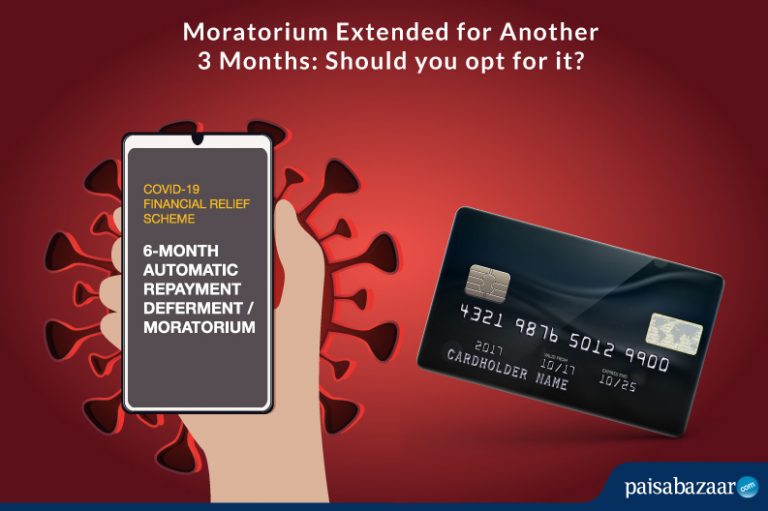
The Reserve Bank of India (RBI) has announced an extension of the moratorium on loan EMIs including credit cards till August 31, 2020. While it was announced for 3 months initially till May 31 2020, the moratorium now has been extended for another 3 months till August 31, 2020. This means that those who have opted for moratorium need not pay EMI on the loans or credit card dues in this period.
But how opting for the same can impact your future lending? And should you or should you not opt for this? Here we will discuss the impact of the moratorium extension, how much more you will be paying at the end and whether you should go for it or not?
How the Moratorium will Impact you if you opt for it?
The motive behind this extension announced by RBI is to provide temporary relief to the people facing financial hardship caused by COVID-19 pandemic. However, opting for the same can impact you in the following ways-
- The interest will continue to accrue on the unpaid dues during the moratorium period of 6 months (refer to the below-mentioned illustration on interest calculation)
- You can defer payment by paying the ‘minimum due amount’ and roll over the balance amount to the next month. But when you do this, the unpaid amount is carried forward to the next billing cycle and about 2-4% interest is levied on the outstanding amount
- If you make any further purchases during these 6 months, the interest in the new expenditure will also start accruing and may add to additional costs
Repayment Schedule
If you opt for the moratorium extension, you need not pay your credit card dues for 6 months starting from 1st March 2020 to 31st August 2020. However, a moratorium is just a deferment of payment and not the waiver. It is only a grace period, so you will have to pay the accrued interest when the moratorium period gets over.
| It is only to provide temporary relief to those whose incomes have been impacted by the Covid-19 lockdown. Our advice would be not to choose the moratorium and continue paying your dues on time as finance charges on your unpaid credit card dues can go up to 49% p.a. |
Read more: How much would a credit card cost?
Pros and Cons of Opting for Moratorium
Following are some of the advantages and disadvantages of opting for a moratorium and further extending the same for another 3 months-
| Pros | Cons |
| ● No late payment fees will be levied on your credit card
● For those facing a financial crunch, you will get another 3 months extra to pay off your dues ● The deferment of payment will neither incur penal charges nor impact your credit score |
● Interest will continue to accrue for 6 months, leading to high charges
● Both interest and the outstanding payable amount can increase your payment burden once the period gets over ● Opting for a moratorium will make it difficult for you to take consumer loans for at least 9-12 months post moratorium |
2 Comments
हेलो मैं मदन लाल शर्मा मैम जी मेरे मोबाइल पर बारी बारी पर मैसेज आ रहा है की प्रिय कार्ड मेंबर 3237 समाप्त होने वाले हैं आपके कार्ड के लिए स्टेटमेंट आपकी ईमेल आईडी पर भेजा जाएगा न्यूनतम दे राशि 860 कुल दे. राशि rs 7556 3 August 2020 के कारण भुगतान मोरटोरियम के बारे में जानिए यह मैसेज मेरे पास बार-बार आ रहा है और मैंने ओन्ली ₹667 के करीब क्रेडिट कार्ड यूज़ किया प्लीज मैम इसके बारे में मुझे समझाइए प्लीज
मदन लाल शर्मा जी, अगर आपने अपने क्रेडिट कार्ड पर मोराटोरियम लिया है उस पर ब्याज लग रहा होगा। और क्रेडिट कार्ड की ब्याज दर किसी भी क्रेडिट प्रोडक्ट के मुकाबले सबसे ज़्यादा होती है। लेकिन ब्याज दर इतनी ज़्यादा नहीं हो सकती कि ₹667 का बिल ब्याज लगकर ₹7556 हो जाए।
इसलिए पहले आप ये देखें कि मोराटोरियम लेने से पहले आपका कुल बिल कितना था और उसके बाद बैंक से संपर्क कर इस बात की जानकारी दें।
आप अपने नेट बैंकिंग अकाउंट में लॉग-इन कर मोराटोरियम से पहले के बिल, अपना वर्तमान बिल और लागू ब्याज दर का पता कर सकते हैं ।